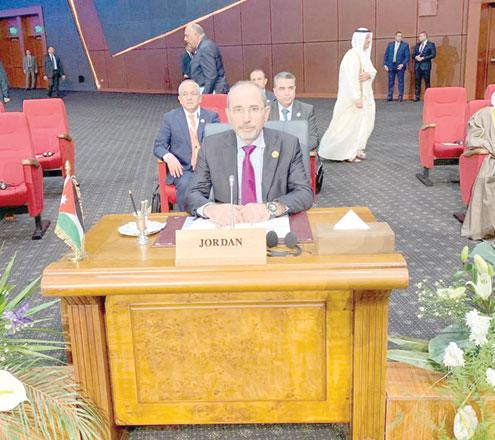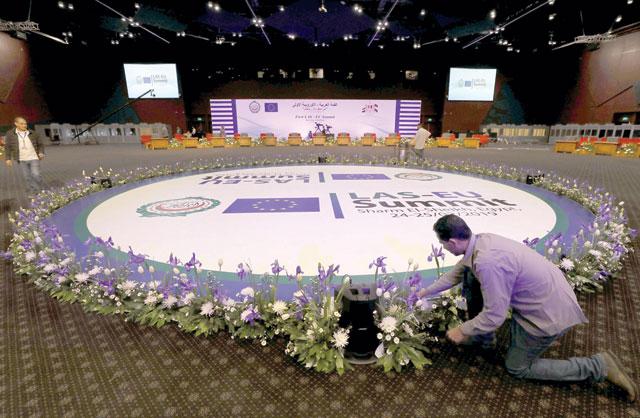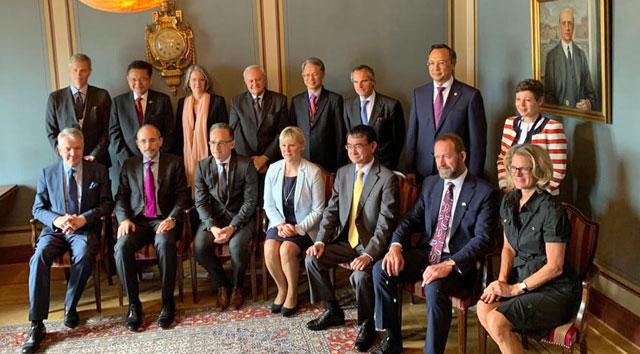You are here
Jordan says resolving regional crises prerequisite for EU security
By JT - Feb 25,2019 - Last updated at Feb 25,2019

Deputising for His Majesty King Abdullah, Foreign Minister Ayman Safadi delivers Jordan’s address at the Arab-EU summit in Sharm El Sheikh, Egypt, on Monday (Petra photo)
AMMAN — The long history of Arab-European interaction has proven that the Arab world and Europe have factors that unite more than separate, Foreign Minister Ayman Safadi said on Monday.
Addressing the first Arab-EU summit in Sharm El Sheikh, Egypt, Safadi, deputising for His Majesty King Abdullah, said that building on commonalities ensures achieving security and economic interests that can be boosted through developing cultural, commercial, investment and security cooperation, according to a ministry statement.
The minister added that there is a link between the security and stability of the Arab region and those of Europe, which makes the Arab-European cooperation and resolving Arab crises necessities for safeguarding the security of Europe and addressing the joint challenge of refuge and migration.
The Palestinian-Israeli conflict is the core of tension in the region, due to the injustice, suffering and rights violations it inflicts on the Palestinian people, whose issue is Jordan’s central cause, he stressed.
The only means to realise comprehensive peace is solving the conflict according to a two-state solution that ends occupation and guarantees the establishment of an independent Palestinian state on the pre-1967 borders with East Jerusalem as its capital, living in peace and security with Israel, based on international legitimacy resolutions and the Arab Peace Initiative, Safadi reiterated.
The top diplomat added that Jerusalem, a holy city to Muslims, Christians and Jews, as stressed by His Majesty, the custodian of its Islamic and Christian holy sites, is the key to peace.
The Kingdom will continue exerting all possible efforts to safeguard the city’s holy sites and maintain its Islamic and Christian Arab identity, he underscored.
Safadi expressed Jordan’s appreciation for the EU’s stance in support of the two-state solution and for its policies that have always sought to alleviate suffering and find hope, including its condemnation of occupation, which violates international law.
The minister also commended the EU’s support to UNRWA, which must be assisted to be able to continue its duties as stipulated in relevant UN resolutions, until the refugee issue is resolved within a comprehensive solution to the conflict.
He also voiced Jordan’s gratitude for the European support to Syrian refugees, expressing hope that the third Brussels conference next month would result in real commitments towards Syrian refugees and host countries.
Despite its difficult economic conditions, the Kingdom hosts some 1.3 million Syrian “brothers”, Safadi said, thanking all those who helped Jordan provide main services and decent living conditions to them and highlighting the importance of sustaining such aid.
The foreign minister also highlighted the importance of ending the crisis in Yemen in accordance with UN Resolution 2216 and other references, noting that the Houthis’ commitment to the Stockholm agreement constitutes an important step towards reaching a solution.
There is also a dire need for reaching a political solution to the Libyan crisis that lays the path for the reconstruction of the country, Safadi added, stressing that supporting Iraq in its rebuilding bid is a main prerequisite to consolidate regional stability.
He added that the stability of the Middle East requires regional relations to be based on mutual respect and refraining from interferences in neighbours’ internal affairs.
The minister affirmed that solving regional crises is a key tool in the world’s common war against terrorism, which feeds on chaos and spreads in the environments of despair, stressing that the Kingdom will continue to be on the forefront of efforts aimed at uprooting terrorism.
On the sidelines of the summit, which concluded on Monday, Safadi held talks with several heads of delegations and counterparts.
During talks with Chairman of the Presidential Council of Libya Fayez Sarraj, Safadi and the chairman discussed the means to build on the positive outcomes of His Majesty King Abdullah’s talks with Sarraj during his visit to Amman, according to a ministry statement.
They also went over the issues of Libyan debts to Jordanian hospitals and endeavours to release Jordanian detainees in Libya.
Sarraj voiced his country’s commitment to settling hospital debts as soon as possible, and pledged to start procedures to follow up on the detainees issue.
Safadi’s meeting with Czech Prime Minister Andrej Babiš focused on enhancing cooperation at the economic, commercial and defence levels, as well as boosting cooperation in the tourism sector.
He also acquainted the prime minister with the pressures imposed on Jordan as a result of regional crises and economic reforms, highlighting the significance of the London initiative to support the Kingdom’s economy.
Regional developments, mainly those related to the Palestinian issue, the Syrian crisis and the war on terror were also addressed during the meeting.
The minister’s meeting with Estonian Prime Minister Jüri Ratas focused on developing bilateral relations, as well as the latest regional developments.
Safadi’s talks with his Tunisian counterpart Khemaies Jhinaoui went over Tunis’ preparations to host the ordinary session of the Arab summit in March, as well as the latest developments in Arab causes.
The minister also met with his Kuwaiti, Bahraini, Mauritanian and Sudanese counterparts, according to the statement.
Related Articles
AMMAN — Deputising for His Majesty King Abdullah, Foreign Minister Ayman Safadi on Sunday will head Jordan’s delegation to the Arab-European
AMMAN — Deputy Prime Minister and Foreign Minister Ayman Safadi on Thursday held several bilateral meetings with Arab counterparts on the si
AMMAN — No economic proposition can replace a political resolution to the occupation of Palestine, one that is founded on the basis of the t














